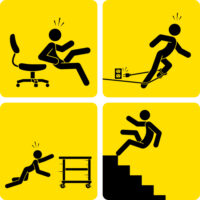New York Court Considers whether Trip Caused by “Trivial Defect”

The State of New York allows for victims of trip-and-fall accidents to seek damages from property owners when hazardous conditions on the owner’s property caused the victim’s fall. However, there are certain types of hazards for which a court won’t find a property owner liable, even when they resulted in injuries to a visitor. Defendants in a case recently before the Appellate Division attempted to have a trip-and-fall claim dismissed on this basis, in the case titled Cortes v. Taravella Family Trust. This case was head in the Second Department of the Appellate Division, which includes Richmond (Staten Island), Kings (Brooklyn), Queens, Nassau and Suffolk counties. Read on to learn more, and contact an experienced Manhattan personal injury lawyer with any additional questions.
Crack in concrete leads to lawsuit
The plaintiff, Milagros Cortes, was visiting a friend’s home when she tripped on a crack in the concrete patio in the backyard. Cortes was injured by the fall and filed a lawsuit against the home’s owner for money damages relating to her injuries. The defendant filed a motion to dismiss the claim, arguing that the crack was trivial and didn’t support a claim for negligence against the property owner.
Not all defects will result in liability for property owners
Property owners will be held financially accountable for failing to repair hidden hazards on their property that result in injuries to visitors or customers. That said, not every injury suffered by a trip-and-fall victim will support a successful claim for damages against a property owner. For example, if a tripping hazard was created through no fault of the owner shortly before the victim tripped, then the property owner might not face liability due to their lack of warning of the hazard. Likewise, small hazards might not lead to liability, either.
Motions to dismiss based on triviality of defect
A property owner facing a personal injury claim may have a claim dismissed if they can prove that the alleged defect was “trivial.” An example of a trivial defect might be one over which someone might “merely stumble, stub his or her toes, or trip,” explained the court. Judges will look at all the facts of a defect to determine whether it was trivial, the Appellate Division explained, such as the “width, depth, elevation, irregularity and appearance of the defect along with the time, place and circumstance of the injury.” The Appellate Division noted that defendants seeking to dismiss injury claims on the basis that a defect was trivial must show that the claimed defect was “physically insignificant and that the characteristics of the defect or the surrounding circumstances do not increase the risks it poses.” In the recent case, the court determined that the defect that caused Cortes’ fall did not meet the standard of being so trivial as to not support a claim for damages, and the motion to dismiss failed.
If you’ve been injured in a New York trip-and-fall claim and need seasoned legal help in seeking damages for your injuries, contact the knowledgeable, professional, and effective Manhattan personal injury lawyer Leandros A. Vrionedes for a free consultation at 212-889-9362, with additional offices in Queens at 718-777-5895.


